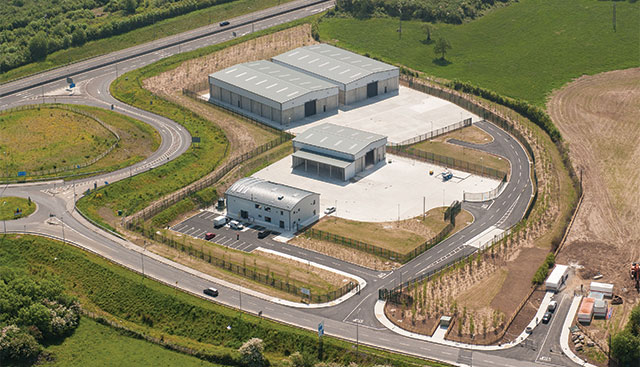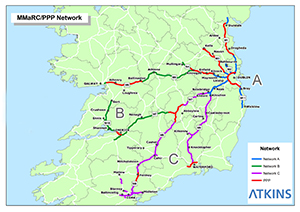Atkins – Protecting the asset

Design, engineering and project management consultants Atkins has played a leading role in Transport Infrastructure Ireland’s transition from roads builder to manager.
 With Ireland’s significant economic development in the 1990’s and 2000’s came the construction of the Motorway network. In 2000, the network extended to approximately 350 km. This increased to 1,224 km by 2010 when the last of the inter-urban Dual Carriageways (mostly Motorways) linking Dublin and the other major cities was completed. The National Roads Authority (NRA) (now incorporated into Transport Infrastructure Ireland [TII]) oversaw the delivery of a massive road building programme which now provides a first class asset for the country. With this development, TII needed to transform it’s role from being road builder to road manager. Atkins, a multidisciplinary design consultancy with offices in Dublin, Cork and Galway, has been central to assisting the TII in making this transformation over the past five years.
With Ireland’s significant economic development in the 1990’s and 2000’s came the construction of the Motorway network. In 2000, the network extended to approximately 350 km. This increased to 1,224 km by 2010 when the last of the inter-urban Dual Carriageways (mostly Motorways) linking Dublin and the other major cities was completed. The National Roads Authority (NRA) (now incorporated into Transport Infrastructure Ireland [TII]) oversaw the delivery of a massive road building programme which now provides a first class asset for the country. With this development, TII needed to transform it’s role from being road builder to road manager. Atkins, a multidisciplinary design consultancy with offices in Dublin, Cork and Galway, has been central to assisting the TII in making this transformation over the past five years.
In 2011, Atkins was awarded the National Roads Network Management Service Contract (NMSC) by TII to develop a strategy for the future maintenance of 744 km of inter-urban motorway network. Atkins has a long history in the road maintenance sector in the UK and their experience of developing road maintenance strategies across several countries is key to their appointment to the commission.
Prior to the commission, each local authority maintained the extent of the motorway network within their respective boundary with funding provided by TII. This included the provision of routine maintenance, winter service and incident response on these strategic sections of the network. In terms of maintenance, the existing service was mostly reactive (responding to major failures) rather than proactive (planned intervention).
Another aspect of the motorway system was the Public Private Partnership (PPP) contracts that exist on parts of the network. These are long term commissions that pass responsibility for maintenance and operation of parts of the network to private operators in return for financing and building that part of the network. The PPP schemes were being maintained to a high standard and disparities were apparent in the visual performance and active management of major incidents on the network.
Strategy
Multinational research demonstrated that maintenance, in most developed countries, was predominantly carried out by the private sector using various forms of contract. Based on this research and cost-benefit analysis, strategic decisions were made to:
• centralise maintenance of the motorways, with responsibility being placed with TII. This would provide consistency of performance across each of the 21 local authorities affected;
• privatise the maintenance function: this had the benefit of utilising the significant knowledge and experience of the road maintenance industry which private contractors had developed, mainly in other countries, but also on the PPP contracts in Ireland;
• divide the country into three maintenance regions which were large enough to encourage interest from the road maintenance industry;
• only permit operators to maintain a single region, thereby establishing three contractors and encouraging long-term competition in the marketplace;
• utilise a medium term contract duration (five years plus client option to extend by a further two years), which would
encourage investment by the private operators;
• provide strategically placed maintenance depots around the network.
TII owned depots were a strategic requirement of the maintenance contracts. Atkins, as a multidisciplinary design consultancy, developed seven depots to planning stage and undertook detail design and provided construction administration and site supervision of four depots. The services that Atkins provided includes amongst others:
• civil and structural engineering;
• mechanical and electrical engineering;
• environmental assessment;
• geotechnical engineering;
• planning services;
• health and safety compliance;
• project management;
• architecture;
• quantity surveying.
The depots have a consistent appearance and were constructed to similar performance specifications which have been designed to last. The depots are an investment and an asset that can be transferred from one generation of maintenance contracts to the next.
Implementation
In conjunction with TII, Atkins developed the new maintenance contracts, referred to as the Motorway Maintenance and Renewals Contracts (MMaRC). The contracts include the following services:
• routine and reactive maintenance;
• incident support the emergency services;
• winter services (gritting and snow ploughing);
• asset collection and management;
• renewal works.
Atkins were successful in securing the Motorway Contracts Audit and Administration Services (MCAAS) commission which extends for four years plus the option to extend by two years. The role to date has comprised of the following:
• administration of the MMaRC contracts;
• audits of MMaRC and PPP contracts;
• design;
• contract supervision;
• inspection and monitoring;
• advice;
• project and programme management;
• cost consultancy;
• value engineering.
Challenges
As with all new contracts, challenges emerged for the operators, TII and Atkins. Some of these challenges included the existing asset condition, the collation of data across a number  of data headings (asset data and inventory associated with that asset), incident data and monitoring and reporting on potential insurance claims related to road traffic collisions.
of data headings (asset data and inventory associated with that asset), incident data and monitoring and reporting on potential insurance claims related to road traffic collisions.
There have been many success stories associated with the MMaRC contracts such as the improved conditions achieved on the network over the past few years. In addition, the data collection exercises, have given TII a greater understanding of the asset that they are managing and the need for its maintenance and potential upgrade over the coming years.
Micheál McKittrick has been leading this project from the beginning and now manages a team of 15 in delivering the services to TII.
“Managing an asset and a contract on this scale requires a number of different elements – not least the required systems and processes to ensure that all elements are addressed as well as an experienced and dedicated team to understand the issues and react to the
demands of the contract,” says Atkins Associate Director Micheál McKittrick
With these contracts now at the halfway point it is both an appropriate time to review the effectiveness and success of these contracts as well as look forward to see what changes should be made in the future. The general consensus across TII, the local authorities is that the services provided are key to the successful operation of the network and that the contracts have been a success to date.
The expertise delivered by the Atkins team on this commission across a range of services and areas of expertise is indicative of the services similarly offered to a wide range of public and private sector clients across all areas of the engineering and architecture spectrum. Clients continue to return to Atkins as they know that they will get a first class service and approach that has the confidence of being backed up by industry experts in their field to ensure successful project delivery. This is the approach that is taken on the MMaRC project and with a number of years remaining on this commission it is hoped to continue this level of service to ensure its continued successful delivery.

ATKINS
Dublin – Cork – Galway – Belfast
Email: info.ie@atkinsglobal.com
Web: www.atkinsireland.ie





